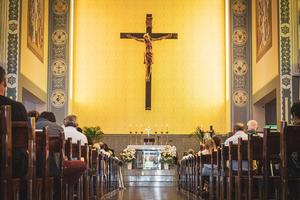‘Where Are the Nine?’: A Thanksgiving Reflection
How often do we thank God for our lives, his love and mercy?

While on his way to Jerusalem, passing between Samaria and Galilee, Jesus was “met by 10 lepers, who stood at distance,” pleading for his mercy and healing. In his mercy, Christ showed compassion toward the suffering invalids, who were not only ostracized from society, but banned from worshipping properly in the Temple — and, therefore, banned from full communion in the Covenant.
Jesus then tells the lepers, “Go and show yourselves to the priests.” While en route, following his direction, those once infected discover they had been miraculously cleansed. Though 10 were healed, only one — a Samaritan — “turned back, praising God with a loud voice; and he fell on his face at Jesus’ feet, giving him thanks.” It is hard to gauge exactly how Jesus must have felt in that moment, since Luke’s Gospel, in Chapter 17, provides no inflection to Christ’s response, but ultimately he seems to express a deep sorrow. After all, he asks, “Were not 10 cleansed? Where are the nine? Was no one found to return and give praise to God except this foreigner?”
The passage ends with Christ’s love for the Samaritan, saying, “Rise and go your way; your faith has made you well.”
But what happened to the other nine?
Scripture provides no answer to the rest of their lives. One can only hope they are residing with God in his eternal glory. But this biblical encounter with Jesus reflects the human heart’s brokenness.
More often than not, we are akin to the nine: ungrateful, selfish or ignorant of God’s blessings in our daily lives. But who were the nine lepers? The fact Luke’s Gospel — and Christ himself — identifies the one who returned as a Samaritan and foreigner reveals the others may have been Jews. Samaritans had a fraught relationship with Jews, extending back to when a civil war split the Kingdom of Israel nearly 900 years prior to Christ. The episode serves as an instruction to his disciples — then and now — that simply because one was born or baptized into the Covenant does not guarantee spiritual fortitude or even oneness with God.
Ultimately, the nine lacked self-awareness and humility. But more than that, they failed to show gratitude for an immense gift. With Christ’s healing, the nine could reenter society and rejoin their families and friends. However, instead of recognizing God’s benevolence by praising him first, they had let other interests supersede the Author of creation.
How often are we like the nine? How often do we praise God first thing in the morning, for the new day — a day we did not earn on our own or even deserve? How often do we simply say, “Thank you” for our lives, his love and mercy?
Too often, too many people only turn to God when they need to be bailed out. (As the aphorism suggests, “There are no atheists in foxholes.”) Yet, as Christ says, again in Luke’s Gospel, “Therefore I tell you, do not be anxious,” for “which of you by being anxious can add a cubit to his span of life?”
Existence itself is a blessing. You are singular — and worth the blood Christ spilled on Calvary 2,000 years ago and the continued offering of himself in the Eucharist at Mass.
This Thanksgiving, let us resolve to not be like the nine who went off into the obscurity of scriptural history, but live like the Samaritan, who returned — praising God before anything else.
- Keywords:
- giving thanks to god
- thanksgiving















